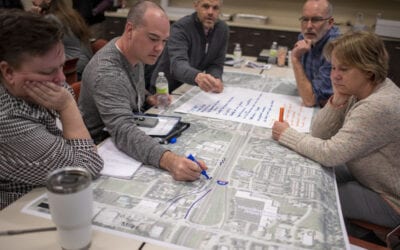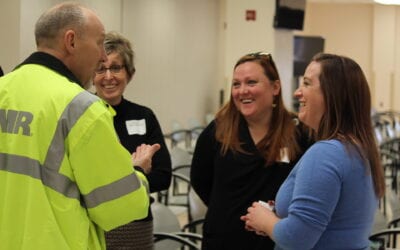How to Have a COVID-19 Conversation

We’ve been dealing with the COVID-19 pandemic for eight months here in the Kansas City metro area, but it’s important to not let COVID-19 caution fatigue catch up to us. Over the past week, we’ve seen record-breaking infection rates across the country. Now is not the time to let our guard down.
Many of us continue to follow preventative measures, such as wearing masks, social distancing, and washing our hands frequently, but it can be easy to fall back on or forget precautions from time to time. So, how do we keep each other accountable when our coworkers, family, friends, or strangers aren’t following safety precautions?
Here are some tips for approaching these conversations effectively:
Talking with Friends and Family
It’s understandable for us to miss the social aspects of normal life. Connecting with others is important for our mental and emotional well-being, especially during stressful times. Some activities or get-togethers are riskier than others, so it’s important to set expectations beforehand with your friends and family.
If you’re thinking of getting together with family and friends who do not live in your household, you can start off a conversation like this: “I’d love to see you, but I’d also like to talk about the safety measures we’ve been following and the risks we’ve been taking before making plans. I want to make sure we’re both on the same page and comfortable with getting together.”
Begin the conversation from a place of respect. From there, try to set expectations of wearing masks, limiting the number of people, and social distancing.
If you are close enough to the people you’re meeting up with, you should feel comfortable enough to have a conversation about COVID-19 safety. If you don’t have that kind of relationship, it may not be the best time to get together.
Talking with Coworkers
With coworkers, the conversation may be a little less comfortable. If you have coworkers who forget to wear their masks or get too close for comfort, focus on the positive. Consider that they could be accidentally slipping up and not intentionally ignoring preventative measures. Avoid “should” phrases and give them insight to empathize with you. For example, you may share with them that you are at risk or live with people who have a high risk of complications for COVID-19.
Addressing shared goals will also give you a jumping-off point for a dialogue about COVID-19 safety. You may bring up your goal of staying healthy or stopping the spread of the virus. From there, you can see if your colleague is on the same page.
If all else fails, defer to management — especially as we are currently under a mask mandate. Your management should focus on setting safety precedents and remind employees of the measures along the way. A good way to keep preventative measures fresh in everyone’s minds is by putting up signs.
Addressing Strangers
By now, many of us have experienced people openly coughing, standing a little too close for comfort, or not wearing a mask while out in public. In order to address a stranger, begin the conversation with a “gentle start-up.” These conversations begin with “I” and focus on how you feel, rather than what they’re doing. Try: “Hey! I’m worried about getting you sick, can we please stand 6 feet apart?” Having an idea of what you plan to say helps to prevent awkwardness and hurt feelings.
If you ask someone to respect your space or wear a mask and they don’t, it may be best to remove yourself from the situation. Ask yourself: “Do I need to be at this restaurant? Can I return to the grocery store tomorrow? Can I move away from this person?”
Sources
Archives
- June 2025 (3)
- April 2025 (2)
- February 2025 (1)
- January 2025 (2)
- December 2024 (1)
- September 2024 (2)
- August 2024 (2)
- July 2024 (1)
- June 2024 (1)
- February 2024 (1)
- July 2023 (1)
- March 2023 (1)
- October 2022 (1)
- September 2022 (1)
- August 2022 (1)
- July 2022 (2)
- June 2022 (2)
- May 2022 (1)
- April 2022 (4)
- March 2022 (1)
- February 2022 (1)
- January 2022 (2)
- December 2021 (4)
- November 2021 (3)
- September 2021 (2)
- August 2021 (3)
- July 2021 (2)
- June 2021 (1)
- May 2021 (2)
- March 2021 (1)
- December 2020 (6)
- November 2020 (8)
- October 2020 (4)
- September 2020 (7)
- August 2020 (3)
- July 2020 (11)
- May 2020 (2)
- April 2020 (4)
- March 2020 (1)
Categories
- Communicable Disease (4)
- Clinical Services (18)
- Clinical Servcies (1)
- Health Promotions (71)
- Emergency Preparedness (8)





